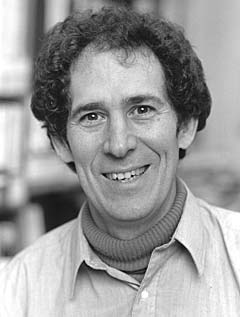California Dreaming
Air Date: Week of June 3, 2005

Stephen Schneider, climatologist and professor of biological sciences at Stanford University (Photo: Stanford University)
Host Steve Curwood talks to Stanford’s Stephen Schneider, who advised Governor Schwartzenegger on his plan to reduce greenhouse emissions.
Transcript
CURWOOD: Joining me to talk about the governor’s plan is Stanford University climatologist Stephen Schneider, who is also an advisor to Governor Schwarzenegger about global warming. Professor Schneider – what’s the significance of this announcement by Governor Schwarzenegger?
SCHNEIDER: What we’ve done is we’ve set a bipartisan example that in my view is dramatically important. It’s a lesson I wish they’d learn inside the beltway because the environment and conservation is a conservative issue. It should not be ideologically polarized into blue and red states. So this may be more important from the fact that a significant Republican did it than actually what he had asked.
CURWOOD: What’s the mechanism of enforcement. I mean it’s fine for a governor to say, “California should do this.” What powers does he have to make it happen?
SCHNEIDER: Steve, you’ve got your finger right on the problem. Uh, you’ve got to have some rules and the rules have got to have teeth and that’s going to take political buy-in and this announcement from the governor today is part of the process of getting the public to buy into the need for real rules with enforcement, but we’re not there yet. So this is important to get us going, but the next thing to do Steve, we’ve got to do it or this really is just talk, is we have to have the California legislature pass rules for efficiency, of appliances efficiency, of cars which is already done. We have to defend them in court and not lose to the auto industry, it’s not clear about that.
We have to then set-up a cap and trade program where we have limits on emissions and we allow the polluters that can’t make it to buy from those people who are more efficient than their requirements and they actually get a reward for having invented clean mechanisms and all those kinds of rules will now have to be implemented. I actually think there’s a decent chance they’ll get implemented in California.
Then other states, New York, Massachusetts, and other states in the Northeast and Oregon and Washington have all said, “well if California does it, we’re going to do it.” So pretty soon we start surrounding the federal recalcitrants. The ones that are hanging back and refusing to do anything and we’ll have to get those guys to finally do the right thing which is to set it up the level we have to set it up which is nationally.
CURWOOD: Um, how does Governor Schwarzenegger’s plan compare to the Kyoto process?
SCHNEIDER: It’s stronger in the long run and weaker in the short run. Kyoto said that we needed to cut in the United States to seven percent approximately below our 1990 levels of emissions, but we’ve been going way up, we’re like 15, 18 percent higher now than we were in 1990. And the California cut that he talked about was to the year 2000. So it’s still different. The California target that the governor’s talking about is still about an eight percent increase to 2010. But without it we would have been a 20 or a 22 percent increase so it’s a big change.
CURWOOD: Now one of the mechanisms that California is looking to is to use the cap and trade system to meet this very ambitious goal of greenhouse gas emissions by 2050. That would mean California as a state would be trading with other countries.
|
SCHNEIDER: We would have to figure that out. First of all we could certainly trade with other states and there are other states particularly in the Northeast which, if California does this, are going to do it too. California has always been in that kind of a leadership role and other states want to get in on the act. And we’re therefore going to take action. But if we can get beyond the US and be able to do trades in other countries, I don’t see any absolute legal impediment to it, but it could be some interesting court tests. We should do it at the federal level, but when the feds won’t do it, the states have to take up the slack. I’ll give you an example. Back in the ‘70s in the energy crisis, California passed a rule fought and screamed at by the electric appliance industry requiring more than a factor of two, improvement in the efficiency of refrigerators. They said it would be too expensive and everybody’s refrigerator would be too small. None of that happened. In fact the feds adopted those rules a few years later and the amount of the electricity saved is so amazing that despite the Vice President telling us that energy efficiency is a moral virtue and doesn’t do anything really and you need supply like ANWR, we have already saved just from refrigerators alone from the initial California rules that went national, two ANWRs in energy, so there’s a lot we can do. CURWOOD: Professor Stephen Schneider is a climatologist at Stanford University and an advisor to Governor Arnold Schwarzenegger on climate change. Thank you sir. SCHNEIDER: Thank you Steve. Living on Earth wants to hear from you!Living on Earth Newsletter [Click here]
Donate to Living on Earth! NewsletterLiving on Earth offers a weekly delivery of the show's rundown to your mailbox. Sign up for our newsletter today!
|






